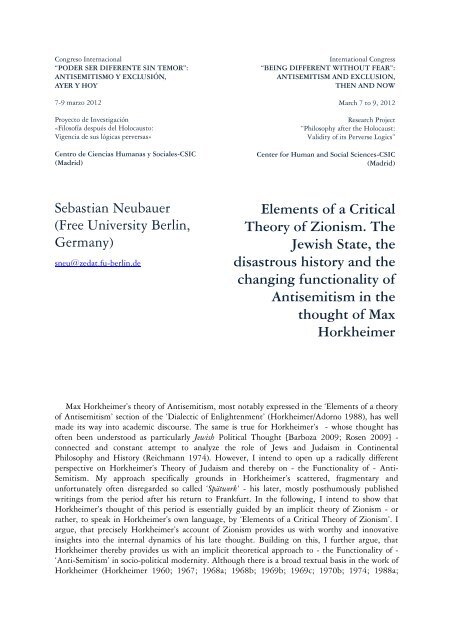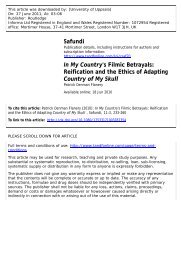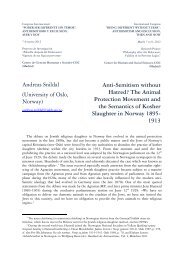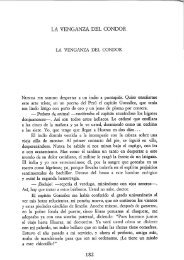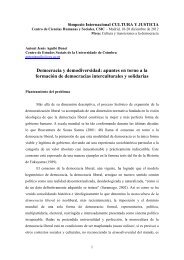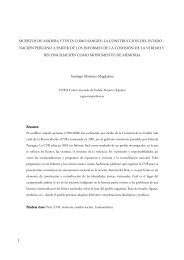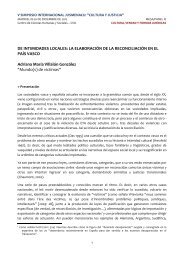Sebastian Neubauer (Free University Berlin, Germany ... - jusmenacu
Sebastian Neubauer (Free University Berlin, Germany ... - jusmenacu
Sebastian Neubauer (Free University Berlin, Germany ... - jusmenacu
Create successful ePaper yourself
Turn your PDF publications into a flip-book with our unique Google optimized e-Paper software.
Congreso Internacional<br />
“PODER SER DIFERENTE SIN TEMOR”:<br />
ANTISEMITISMO Y EXCLUSIÓN,<br />
AYER Y HOY<br />
7-9 marzo 2012<br />
Proyecto de Investigación<br />
«Filosofía después del Holocausto:<br />
Vigencia de sus lógicas perversas»<br />
Centro de Ciencias Humanas y Sociales-CSIC<br />
(Madrid)<br />
<strong>Sebastian</strong> <strong>Neubauer</strong><br />
(<strong>Free</strong> <strong>University</strong> <strong>Berlin</strong>,<br />
<strong>Germany</strong>)<br />
sneu@zedat.fu-berlin.de<br />
International Congress<br />
“BEING DIFFERENT WITHOUT FEAR”:<br />
ANTISEMITISM AND EXCLUSION,<br />
THEN AND NOW<br />
March 7 to 9, 2012<br />
Research Project<br />
“Philosophy after the Holocaust:<br />
Validity of its Perverse Logics”<br />
Center for Human and Social Sciences-CSIC<br />
(Madrid)<br />
Elements of a Critical<br />
Theory of Zionism. The<br />
Jewish State, the<br />
disastrous history and the<br />
changing functionality of<br />
Antisemitism in the<br />
thought of Max<br />
Horkheimer<br />
Max Horkheimer‟s theory of Antisemitism, most notably expressed in the „Elements of a theory<br />
of Antisemitism‟ section of the „Dialectic of Enlightenment‟ (Horkheimer/Adorno 1988), has well<br />
made its way into academic discourse. The same is true for Horkheimer‟s - whose thought has<br />
often been understood as particularly Jewish Political Thought [Barboza 2009; Rosen 2009] -<br />
connected and constant attempt to analyze the role of Jews and Judaism in Continental<br />
Philosophy and History (Reichmann 1974). However, I intend to open up a radically different<br />
perspective on Horkheimer‟s Theory of Judaism and thereby on - the Functionality of - Anti-<br />
Semitism. My approach specifically grounds in Horkheimer‟s scattered, fragmentary and<br />
unfortunately often disregarded so called „Spätwerk’ - his later, mostly posthumously published<br />
writings from the period after his return to Frankfurt. In the following, I intend to show that<br />
Horkheimer‟s thought of this period is essentially guided by an implicit theory of Zionism - or<br />
rather, to speak in Horkheimer‟s own language, by „Elements of a Critical Theory of Zionism‟. I<br />
argue, that precisely Horkheimer‟s account of Zionism provides us with worthy and innovative<br />
insights into the internal dynamics of his late thought. Building on this, I further argue, that<br />
Horkheimer thereby provides us with an implicit theoretical approach to - the Functionality of -<br />
„Anti-Semitism‟ in socio-political modernity. Although there is a broad textual basis in the work of<br />
Horkheimer (Horkheimer 1960; 1967; 1968a; 1968b; 1969b; 1969c; 1970b; 1974; 1988a;
1988b; 1988c), the significance of the issue of Zionism and the Jewish State for the latter‟s<br />
thought has so far neither been acknowledged - let alone analyzed - by academic work on<br />
Horkheimer, nor is his voice to be encountered in contemporary critical discourses on Zionism<br />
(Brumlik 2007).<br />
In the following, I aim, first, to approach the late Horkheimer as a Jewish Political Thinker,<br />
thereby elaborating his „Elements of a Critical Theory of Zionism‟. Building on this, I intend,<br />
second, to highlight the significance and over-arching character of the account of Zionism for the<br />
internal dynamics of the late Horkheimer‟s thought. My goal is to show, how these „Elements‟ are<br />
essentially interwoven with Horkheimer‟s Philosophy of History, his analysis of the (back then)<br />
contemporary socio-political world and of utmost importance his conception of Critical Theory as<br />
such. Thereby I argue, Horkheimer‟s so far disregarded account of Zionism can serve as a foil, a<br />
prism, for re-sorting and re-understanding his late thought. By following this line of argument, I<br />
finally argue, that in the last instance Horkheimer‟s account of Zionism bridges into a significantly<br />
re-shaped theory of „Anti-Semitism‟. Thereby, I hope to demonstrate that in the advent of Zionism<br />
the notion of „Functionality‟ radically changes, as Horkheimer leaves the Jews behind. Thus, we<br />
can understand from Horkheimer‟s argument that the „anti-Semitic‟ logic of identity and violence<br />
becomes the sole and entire logic of the perpetuated „disastrous history‟ itself.<br />
First: Horkheimer’s Elements of a Critical Theory of Zionism<br />
It is well known, that Horkheimer‟s life and thought was highly influenced by his personal and<br />
philosophical background in Judaism (Altwickler 2009; Baboza 2009; Ehrlich 2009: Reichmann<br />
2004). A fact that is, of course, more true for his last two decades, than for his previous life. Max<br />
Horkheimer conceived his particularly Jewish identity throughout his entire life as crucial<br />
(Horkheimer 1970b). Accordingly, his biographer Zvi Rosen has shown that Horkheimer‟s<br />
philosophical work in general has been influenced by two major sources: The „German tradition‟<br />
on the one hand and the „Jewish tradition‟ on the other hand (Rosen 2006: 36ff.).<br />
For Horkheimer himself, being Jewish essentially meant to live „in der Erwartung, dass es<br />
einmal in der Welt noch gut wird“ 1 (Horkheimer 1968a: 210). This expectation, which he himself<br />
traced back to his own personal and philosophical Jewish background, is - of course - deeply<br />
reflected throughout his Philosophy. Since Critical Theory - being decisively understood as the<br />
critique of the existing conditions of life - gains, in the last instance, its validity from the<br />
imagination that one day the world could change towards the better, that there might be<br />
something radically „other to-come‟. Therefore, this „other‟, Horkheimer used to call it „das ganz<br />
Andere” 2 (1977b), has to be understood as the utmost core of Horkheimer‟s over-all thought.<br />
This „other‟ is conceived by Horkheimer as being expressed by a number of traits of the Jewish<br />
tradition, which he therefore describes as a “geistige Realität” (Horkheimer 1988c: 331), a<br />
“spiritual reality”. Of particular importance among these traits is the Jewish focus on this world<br />
only as well as the connected Jewish concept of Messianism. Since Judaism does, as Horkheimer<br />
argues, „not know an afterlife“ (Horkheimer 1968a: 210), it aims solely to improve this life,<br />
meaning the life of the entire Jewry and of the generations to-come (1988c: 401/402). This focus<br />
on this world gains, in Horkheimer‟s thought, its particular importance in its connection with the<br />
Jewish conception of Messianism. Horkheimer interprets the latter as expressing the general<br />
quality of „the other to-come‟, which should be, according to the Jewish logic, not be restricted to<br />
1 In the expectation, that the world might one day change towards the better.<br />
2 The radical other.
the Jewish people, but expanded to the entire humanity itself: „Ihr Messias soll nicht nur Israel,<br />
sondern alle Völker erlösen.“ 3 (1988c: 410)<br />
Interestingly enough, Horkheimer conceives this fundamental imagination of the „other‟, the<br />
„spirtiual reality‟ of Judaism as being socially sublated and materialized in the Jewish diaspora.<br />
This „other‟ is, according to Horkheimer, real, since it has its social and historical space in the<br />
material existence of the Jewish diaspora. This interconnection grounds, for Horkheimer, in the<br />
very special social situation of the European Jewry. Horkheimer argues that the eternal suffering<br />
und the never-ending threat the European Jews were exposed to, resulted in a social maintenance<br />
of this „other‟, which itself derives from the Jewish tradition as such:<br />
“Durch Jahrtausende haben die Juden in den Verfolgungen um der Gerechtigkeit willen<br />
zusammengehalten. Ihre Riten [...] waren Momente des Zusammenhalts, der Kontinuität.<br />
Kein Machtstaat, sondern die Hoffnung auf Gerechtigkeit am Ende der Welt hieß<br />
Judentum. Sie waren ein Volk und das Gegenteil, der Vorwurf aller Völker.“ 4 (1974: 369)<br />
This notion of the Jewish diaspora gains, according to Horkheimer, its crucial historical<br />
momentum, after the international workers movement, which had also aimed such a change<br />
towards the „other‟, has been fallen apart. After the historical defeat of the international workers<br />
movement, in Horkheimer‟s view, the Jewish diaspora appears as the last remnant of the „other‟<br />
within the disastrous history. Thus, the diaspora occupies, in Horkheimer‟s thought, the historical<br />
space of the last weak and vulnerable but nevertheless remaining anti-dote to the disastrous<br />
dialectic of history: „Selbst die Vorstellung der Möglichkeit dieses ‚Anderen„ verschwindet 5 “<br />
(1970b: 433).<br />
In the given context it is of particular interest, that Horkheimer blames the historic defeat of<br />
the workers movement on a fact, which he calls „Marx hat die Juden verraten“ 6 (1988b: 351).<br />
Thereby, Horkheimer argues, that Marx‟ Philosophy had failed to expand the ‚spiritual reality„ of<br />
Judaism on the entire society, since it narrowed the general solidarity on the particularity of the<br />
proletariat, subsequently causing the historic defeat of the workers movement.<br />
At this point it should be clear that Judaism conceived as a „spiritual reality‟ sublating „the<br />
other to-come‟ is truly essential for the thought of the late Horkheimer. However, regarding the<br />
fact that Horkheimer connects, as I indicated, this notion of Judaism very strongly to the material<br />
existence of the diaspora, the question opens up, how the advent of Zionism and the Creation of<br />
the State of Israel, which aims per definition for the negation of the diaspora, intervenes into this<br />
line of thought?<br />
First of all, it is very noteworthy that Horkheimer, who has been very much engaged for the<br />
sake of diasporic Judaism, both in the US and in post-war <strong>Germany</strong>, has been, from the very<br />
beginnings on, somewhat distanced towards Zionism and Zionist Organizations. Despite their<br />
high influence in pre-war <strong>Germany</strong>, Horkheimer has, as far as we know, never been in touch with<br />
Zionist youth movements. Furthermore, Horkheimer‟s focus on the diaspora is demonstrated by<br />
the fact, that as early as in 1944 Horkheimer started to worry that within the American Public,<br />
Judaism could become identified with Zionism. This, of course was the Zionists political goal,<br />
whereas Horkheimer feared that precisely these Zionist Politics could contribute to „anti-Semitic‟<br />
resentments within the American Public and weakening the position of the diaspora (Jay 1976:<br />
3 The Jewish Messiah shall redeem not only the people of Israel, but all people of the world.<br />
4 Throughout millennia, the Jews have resisted their persecution for the sake of Justice. Their religious rites […]<br />
were moments of community, of continuity. Not a nation-state based on power, but the desire for justice at the end of<br />
the world was called Judaism. They were a people and its opposite, the accusation of all people.<br />
5 Even the mere imagination of the possibility of this other tends to disappear.<br />
6 Marx betrayed the Jews.
393). This issue was apparently of such crucial importance for Horkheimer, that he intended to<br />
conduct broad sociological research on it. However, the planned project, never materialized due to<br />
a lack of financial means and the changing political situation after the end of the World War<br />
(Rabinbach 2009: 253).<br />
This Horkheimerian particular focus on the diaspora is underlined by the fact that within his<br />
broad correspondence, Horkheimer does not devote a single word to the foundation of the State of<br />
Israel in 1948. However, from the 1950s on we can observe a radical change in Horkheimer‟s<br />
attention. This shift grounds, for my understanding, first, on the fact that Horkheimer started to<br />
realize that the Zionist enterprise succeeds and that it will therefore have a significant impact on<br />
the crucial diaspora, and, second, on the fact that the young state of Israel appeared to be<br />
vulnerably caught in a very precarious political situation. Thus, we can find from this point on,<br />
within the work of Horkheimer, a very strong publicly displayed political solidarity with Israel as<br />
well as a highly critical theorization of the Zionist enterprise, which he kept for the very same<br />
political reasons privately.<br />
Starting with Horkheimer‟s political solidarity, we can conclude that Horkheimer, who himself<br />
never travelled to Israel, displayed this strong political solidarity since the Jewish state provided a<br />
safe haven for endangered Jewish individuals. For instance, Horkheimer himself told in a late<br />
interview: „Man hat daher Israel zu bejahen. Für mich ist entscheidend: Israel ist das Asyl für viele<br />
Menschen.“ 7 (1970b: 398) Horkheimer‟s political solidarity with Israel was further bolstered, since<br />
the Jewish State was a very small and, thus, powerless political entity, which could, as Horkheimer<br />
apparently thought, easily sink in the modern „ocean of violence“ (1968c: 19).<br />
However, underneath this publicly displayed political solidarity, Horkheimer developed from<br />
the 1950s on a very unique and powerful dialectical criticism of the Zionist enterprise, which<br />
should, as I argue, finally essentially re-shape his entire thought. These „Elements of a Critical<br />
Theory of Zionism‟ are very much connected to the core position, outlined above, which<br />
Horkheimer attributes to diasporic Judaism conceived as a „spiritual reality‟ sublating the historical<br />
possibility for „the other to-come‟. Therefore, at the bottom-line of Horkheimer‟s critique of<br />
Zionism appears the argument, that the success of the Zionist movement equals the autoliquidation<br />
of the diaspora and, thus, of the „spiritual reality‟ Judaism:<br />
„Das Symbol der Krise, in der das Judentum heute sich befindet, ist die durch<br />
Verfolgungen bedingte Entstehung Israels, die Rettung jüdischer Menschen, die, nicht<br />
unwahrscheinlich, das Ende des Judentums im geistigen Sinn vorhersehen läßt. Eine<br />
schlechte, aber für die Gegenwart kennzeichnende Dialektik.“ (1985-1996, Band 18:<br />
643) 8<br />
In this line of argument, Horkheimer stresses that the dissolution of Judaism into a Nation<br />
equals the transformation of the power-less into competitors on power. However, according to<br />
Horkheimer, the „spiritual reality‟ materialized in the diaspora, precisely since the Jews were<br />
power-less. Thus, the diasporic Jews could be the historical representatives of „the other to-come‟.<br />
However, by the advent of Zionism, this social position and thus the historical possibility of the<br />
„other‟ appears as being destructed forever:<br />
„Das jüdische Volk war nicht nationalistisch, es trug seine Leiden für die Menschheit. Israel<br />
hingegen ist eine Nation geworden, im Grunde strukturiert wie jede andere, und der<br />
7 We do have to support Israel. For me personally it is crucial, that Israel provides asylum for many individuals.<br />
8 The creation of Israel, which took place due to the persecution and in order to rescue Jewish individuals, is the<br />
symbol of the current crisis of Judaism. However, this crisis points towards the end of the „spiritual reality‟ of Judaism.<br />
It is a worse dialectic, nevertheless characteristic for our age
ursprüngliche messianische Gedanke hat der Selbsterhaltung der eigenen nationalen<br />
Existenz weichen müssen.“ 9 (1988c: 326)<br />
In a note entitled ‚Staat Israel„ Horkheimer further states:<br />
„Jetzt beansprucht ein Staat, fürs Judentum zu sprechen, das Judentum zu sein. Das<br />
jüdische Volk, an dem das Unrecht aller Völker zur Anklage geworden, ist […] nun selber<br />
positiv geworden. Nation unter Nationen, Soldaten, Führer, money-raisers für sich selbst.<br />
[...] Wie hat es [das Judentum] doch im Triumph seines zeitlichen Erfolges im Grunde<br />
resigniert! Es bezahlt sein Fortbestehen mit dem Tribut ans Gesetz der Welt, wie sie ist.<br />
Wenn es auch Hebräisch zur Sprache hat, es ist die des Erfolges, nicht die der Propheten.<br />
Es hat sich dem Zustand der Welt assimiliert. Wer von Schuld sich frei weiß, werfe den<br />
ersten Stein. Nur - es ist schade, durch solchen Verzicht kommt eben das aus der Welt,<br />
was sich durch ihn erhalten sollte.“ 10 (1974: 369)<br />
According, to this harsh critique of Zionism, Horkheimer polemically writes about modern<br />
Jewry: „Die modernen Juden haben das Höhere aufgegeben, um das Niedere zu akzeptieren.“ 11<br />
(1988c: 332). The force of Horkheimer‟s critique of Zionism is probably most noteworthy<br />
displayed in the following passage of an early draft of ‚Zur Ergreifung Eichmanns„, which was later<br />
removed from the final version due to Adorno‟s intervention:<br />
„Was immer Eichmann in Israel geschehen wird, beweist die Ohnmacht, nicht die Macht<br />
der ihrer selbst und ihres Rechts bewussten Juden, die Anmaßung, nicht die Gewohnheit<br />
der staatlichen Autorität in Israel. Jeder weiß, dass man die totalitären Allüren, die an<br />
Benito und die Russen gemahnen, den Israelis im Hinblick auf New York noch einmal<br />
hingehen ließ.“ 12 (1974: 348)<br />
From these words, explicitly comparing the State of Israel with Stalin‟s totalitarian Sowjet<br />
Union and Mussolini‟s Italy, we can understand, that Horkheimer was truly and deeply concerned<br />
with the Zionist enterprise and its success.<br />
Before I go on to examine these concerns, it has to be added, that Horkheimer, of course,<br />
thinks the issue of Zionism dialectically. In his view, not the Jews are to be blamed for the fatal<br />
transformation of the diaspora, which sublated the „other‟, into a Nation-State which becomes like<br />
everything else and thus annihilates the last remaining historical possibility of the „other‟. To the<br />
contrary, Horkheimer perceives the creation of the Jewish State as a result of the disastrous history<br />
itself, as being without alternative in order to provide a safe haven for persecuted Jewish<br />
individuals:<br />
9 The Jewish people were not nationalistic at all, they were suffering for the sake of all Humanity. Israel, to the<br />
contrary, is a nation-state, at its basis structured like all others. Thus, the original messianic thought had to vanish for<br />
the sake of national existence.<br />
10 In nowadays a State claims to speak for Judaism, to be itself Judaism. The Jewish people, who used to be the<br />
accusation of all people, have themselves become positive. Nation among nations, soliders, leaders, money-raisers for<br />
themselves. […] How has Judaism, in fact, resigned in the face of its temporal triumph! Judaism pays for its ongoing<br />
existence by accommodating to the world as it is. Although Hebrew is the language of Israel, it is the language of<br />
success and not the language of the prophets. Judaism has itself assimilated to the existing state of the world. The one<br />
who is free of guilt, shall throw the first rock. Just, it is sad, since by means of this sacrifice, the other vanishes from<br />
the world, which actually should be preserved through it.<br />
11 The modern Jews gave up the better, the other, in order to accept the existing, the worse.<br />
12 Whatever will happen to Eichmann in Israel, it demonstrates the lack of power and not the power of the selfconscious<br />
Jews. It demonstrates the pretension and not the practice of the authority of the State of Israel. Everyone<br />
knows that Israel‟s totalitarian affectations, which recall Benito and the Russians, were tolerated this time only with<br />
respect to New York.
„Um sich zu retten hatten sie die Alternative, ihren Gott zu verleugnen oder sich als Staat<br />
zu konstituieren. Beides bedeutet den Untergang des Judentums: das erste das<br />
Verschwinden aus der Welt, das zweite den Umschlag in den unvermeidlichen<br />
Nationalismus der anderen: Israel.“ 13 (1988b: 314)<br />
Second: The account of Zionism as a prism for understanding the thought of the late<br />
Horkheimer<br />
Building on the outlined Horkheimerian view, that the success of the Zionist enterprise equals<br />
the liquidation of Judaism as „spiritual reality‟ and thus of the last remnant of the „other‟ in the<br />
disastrous history, I would like to explore in the following the far-reaching consequences of this<br />
argument for Horkheimer‟s over-all thought, before focusing in the last section of my presentation<br />
on the issue of „Anti-Semitism‟.<br />
Very basically, Horkheimer conceived the fatal but nevertheless alternative-less success of the<br />
Zionist enterprise as the disastrous history coming to itself, as the closing point for the possibility<br />
to transform the ever-ongoing pre-history into real history. Thus, the materialization of Zionism in<br />
the shape of the Jewish State necessarily appears, in Horkheimer, as the eternal perpetuation of the<br />
„disastrous history‟, and is therefore characterized as the “darkest aspect of all history”: „Es ist der<br />
trübste Aspekt der Geschichte, […] der trübste sowohl für das Judentum wie für Europa, dass der<br />
Zionismus recht behielt.“ 14 (1961a: 166/167)<br />
This tragic but unavoidable loss of the social and historical possibility of the „other‟, the better,<br />
has, in Horkheimer‟s view, far reaching consequences for the possibility of Philosophy and of<br />
Critical Theory in general. If we recall, that Horkheimer conceives the imagination of the „other‟,<br />
the better as the core of all Philosophy, as providing, in the last instance, validity to the entire<br />
project, we can imagine the consequences that he perceives in facing this fatal tragedy, called the<br />
success of Zionism. In a note entitled „Ausgeträumt„, Horkheimer expresses in a very condensed<br />
way his view on the interconnection of Judaism, the disastrous history, the success of Zionism and<br />
the consequences of this entire historical development for the possibility of Critical Theory, of<br />
Philosophy as such:<br />
„Der Traum vom Messias, des Anbruchs der Gerechtigkeit auf Erden, der in der Diaspora<br />
die Juden zusammenhält, ist ausgeträumt. Er hat unendlich viele Märtyrer gefunden,<br />
unendliches Leid verursacht und Hoffnung gewährt. Jetzt sind die Verfolgten ohne Messias<br />
nach Zion gezogen, haben wie andere Völker ihre Nation und ihren Nationalismus<br />
etabliert, und das Judentum wurde zur bloßen Religion. Die in der Diaspora verbleiben,<br />
können sich entscheiden; sei es für Israel, für die Auflösung in der Nation […] oder sie<br />
müssen als Juden provinziell werden, romantische Sektierer ohne geschichtliche Substanz.<br />
Die Diaspora ist eine Hinterwelt. Die Juden sind Überbleibsel. [...] Wer an die kritische<br />
Theorie sich hält, kann für eine […] Form des Nationalismus sich entscheiden, den<br />
sogenannten kommunistischen […], oder provinziell werden, romantischer Sektierer. Das<br />
Reich der Freiheit ist eine Hinterwelt. Die zur Theorie halten, sind Überbleibsel wie die<br />
Getreuen des Talmud und des messianischen Vertrauens.“ 15 (1974: 392)<br />
13 In order to rescue themselves, they had the alternative either to repudiate their God or to become a Nationstate.<br />
Both means the decay of Judaism: The former vanishing from the world, the latter the unavoidable<br />
transformation into Nationalism: Israel.<br />
14 It is the darkest aspect of all history, the darkest for both Judaism and Europe, that Zionism was proven to be<br />
right.<br />
15 The dream of the Messiah, of eternal justice on earth, which had given community to the Jews in the diaspora,<br />
has come to an end. This dream has led to uncounted numbers of martyrs, it had caused eternal suffering and at the<br />
same time given eternal hope. Now the persecuted went to Zion without Messiah. They have established their Nation<br />
and their Nationalism like all other people, whereas Judaism itself degraded to be a mere religion. The ones, who
If we pay close attention to these few sentences, we may recognize something truly remarkable.<br />
Horkheimer argues that in the Zionist age, of course, promoted by the disastrous history itself,<br />
Critical Theory, Philosophy in general becomes “backwardness”, loses its connection to History, its<br />
social space, and therefore its over-all social meaning. For Horkheimer, in the Zionist age, the<br />
Critical Theorists become ‚romantic sectarians„. Their time has forever passed, since with the<br />
diaspora also the social space, the historical sublation of the imagination and thus the historical<br />
possibility of the „other‟ has forever vanished.<br />
Facing this general loss of possibility, of social meaning, Horkheimer‟s critique of Zionism<br />
transforms itself into a critique of mourning, which again transforms the position of Critical<br />
Theorists in the light of the inevitable triumph of Zionism into a position of, speaking polemically,<br />
professional mourning:<br />
„Dem kann ich nicht widersprechen, aber auch der Trauer mich nicht erwehren, dass es der<br />
Wiederholung des Zugs ins Heilige Land ohne den Anbruch der richtigen Zeit bedurfte.“ 16<br />
(Horkheimer 1974: 380/381)<br />
Third: A theory of the (Functionality) of Anti-Semitism in the Zionist Age<br />
So far, I have highlighted the over-arching position of the issue of Zionism for the thought of<br />
late Horkheimer as well as Zionism‟s manifold implications for understanding core topics of his<br />
work. Although, this field is still open for further research, I indicated that Horkheimer‟s<br />
reflections on Zionism may serve as a prism for reading and re-acquiring his scattered and,<br />
unfortunately, often disregarded „Spätwerk‟. However, in the given context the implications of<br />
Horkheimer‟s account of Zionism are particularly striking regarding the theory of Anti-Semitism<br />
and the latter‟s functionality. Accordingly, I would like to, first, explore what, according to<br />
Horkheimer, „Anti-Semitism‟ could mean after the historical disappearance of Judaism and,<br />
second, I would like to outline a Horkheimerian theory of „Anti-Semitism‟ in the Zionist age.<br />
Of course, also in Horkheimer‟s thought, „Anti-Semitism‟ is not necessarily connected to the<br />
meaning of Judaism as such. However, in a late note entitled „Zum Antisemitismus‟, Horkheimer<br />
argues that the Jews of the diaspora became the object of hate and persecution, since they were the<br />
physical representatives of the „other‟, the „better‟. He writes, that the Jews„ mere existance is “ein<br />
Stein des Anstoßes [weil] sie sich dem Absoluten nicht in toto unterwerfen.“ 17 While being<br />
exposed to all this persecution, the Jews - recurring to their tradition - reacted without power by<br />
preserving the „other‟, the better, among their own threatened community. This Horkheimerian<br />
view may rightly be called romantic. Nevertheless, in Horkheimer‟s thought, the outlined<br />
„dialectic‟ maintained throughout history the social and historical possibility of the „other to-come‟.<br />
From this argument it is possible to deduce a double-fold „functionality‟ of „Anti-Semitism‟. On<br />
the one hand, its function appears to be as giving way to violent regression since Anti-Semitism is<br />
conceived as the „inverted‟ wish of the repressed individuals for change towards the „other‟. On the<br />
other hand, somewhat cynically, „Anti-Semitism‟ appears to be historically functional, since it,<br />
despite all involved cruelty, maintained a „dialectic‟ sublating and preserving the „other‟ within<br />
history and society.<br />
remain in the diaspora, can decide either for Israel, which means the dissolution into a nation, or they can maintain<br />
Judaism, which means becoming provincial, becoming romantic sectarians that lack historical substance. Today, the<br />
diaspora is backwardness. The Jews are remnants. The one who remains faithful in Critical Theory can opt for a way of<br />
nationalism, the so called communism or he can become provincial, a romantic sectarian. The realm of freedom has<br />
become backwardness. The ones, who remain faithful in Critical Theory, are last, out-dated, remnants like the faithful<br />
Jews.<br />
16 I have nothing to oppose, but I do have to mourn, that the repetition of the return to the holy land had taken<br />
place before its time had come.<br />
17 The thorn in our side, since they refuse to completely subjugate to the absolute.
However, in Horkheimer‟s view, precisely this „dialectic‟ comes with the advent of Zionism to a<br />
tragic end; by the destruction of the „diaspora‟ and its transformation into a power seeking<br />
Nationalism, this entire „dialectic‟ vanisehs forever. First of all, this historical movement comes<br />
down to the fact, that „conventional‟ Anti-Semitism, understood in the sense outlined above,<br />
vanishes, too. Since the „other‟ is no longer sublated within Judaism, Jews couldn‟t be hated any<br />
more for representing precisely this „other‟. However, social repression, the individuals „inverted‟<br />
wish for changing towards the „other‟, their hate on this „other‟, does not vanish with its historical<br />
possibility. To the contrary, if Zionism - the specific Jewish response to Anti-Semitism - appears as<br />
the „auto-liquidation‟ of Judaism and thereby as the eternal perpetuation of the disastrous history,<br />
the social hate on the „other‟, now including Jews as well, seems to be eternally perpetuated, too.<br />
Thus, I finally argue, that we can - if we pay attention to Horkheimer‟s „Elements of a Critical<br />
Theory of Zionism‟ - gain hold on the corner-stone of a theory of socio-political Modernity. We<br />
find here a theory of socio-political Modernity, in which „Anti-Semitism‟, the hate of the „other‟<br />
understood as the inverted wish to achieve it, is no longer functional. To the contrary, the entire<br />
world functions in the light of this - rather pessimistic - argument, so to speak, purely „anti-<br />
Semitic‟ - it is not only guided by logics of identity and violence, but in which the logics of identity<br />
and violence have become universal and, thus, reality itself. As late Horkheimer writes: „Der Gang<br />
der Geschichte tendiert auf automatische Reaktion, auf Uniformität, die über terroristische<br />
Perioden sich durchsetzen muss.“ 18 (1988a: 139)<br />
Bibliography<br />
Altwicker, Norbert 2009: Loeb-Lectures. Gastvorlesungen über Geschichte, Philosophie und<br />
Religion des Judentums an der Universität Frankfurt am Main 1956-1957, in: Boll/Gross<br />
2009: 158-161.<br />
Bayer, Oswald 1995: Die Furcht, dass es Gott nicht gebe. Zum Judentum in der Philosophie Max<br />
Horkheimers, in: Lucas, Franz D. (Hg): Geschichte und Geist. Fünf Essays zum<br />
Verständnis des Judentums. <strong>Berlin</strong>: Duncker und Humblot: 35-54.<br />
Barboza, Amalia 2009: Die ‚Jüdische Identität„ der Frankfurter Schule, in: Boll/Gross 2009: 162 -<br />
169<br />
Boll, Monika / Gross, Ralph 2009: Die Frankfurter Schule und Frankfurt. Eine Rückkehr nach<br />
Deutschland, Frankfurt am Main: Wallenstein.<br />
Brumlik, Micha 2007: Kritik des Zionismus, Hamburg: Europäische Verlagsanstalt.<br />
Ehrlich, Ernst Ludwig 2009: Von Hiob zu Horkheimer. Gesammelte Schriften zum Judentum und<br />
seiner Umwelt, <strong>Berlin</strong>: De Gruyter.<br />
Freimüller, Tobias 2009: Max Horkheimer und die jüdische Gemeinde Frankfurt am Main nach<br />
1945, in: Boll/Gross 2009: 150 - 157.<br />
Grigat, Stephan 2006a: Feindaufklärung und Reeducation. Kritische Theorie gegen Postnazismus<br />
und Islamismus, Freiburg: ca-ira.<br />
Grigat, Stephan 2006b: Befreite Gesellschaft und Israel. Zum Verhältnis von Kritischer Theorie<br />
und Zionismus, in Grigat 2006a: 115-129.<br />
Horkheimer, Max 1917: Jochai, in: Horkheimer, Max 1985-1996, Band 1: 264-272.<br />
Horkheimer, Max 1935: Gedanke zur Religion, in: Horkheimer, Max 1985-1996, Band 3: 326-<br />
328.<br />
Horkheimer, Max 1939a: Die Juden und Europa, in: Horkheimer, Max 1985-1996, Band 4: 308-<br />
331.<br />
18 The path of history tends towards automatic reaction, uniformity, which has to materialize through despotic<br />
periods.
Horkheimer, Max 1939b: Jüdischer Charakter, in: Horkheimer, Max 1985-1996, Band 12: 263-<br />
264.<br />
Horkheimer, Max 1944: Antisemitismus: Der soziologische Hintergrund des psychoanalytischen<br />
Forschungsansatzes, in: Horkheimer, Max 1985-1996, Band 5: 364-372.<br />
Horkheimer, Max 1945a: Zur Klassifikation jüdischer Einwanderer, in: Horkheimer, Max 1985-<br />
1996, Band 5: 373-376.<br />
Horkheimer, Max 1945b: Die Juden und der Eid, in: Horkheimer, Max 1985-1996, Band 12:<br />
303-305.<br />
Horkheimer, Max 1960: Zur Ergreifung Eichmanns, in: Horkheimer, Max 1985-1996, Band 8:<br />
156-159.<br />
Horkheimer, Max 1961a: Über die deutschen Juden, in: Horkheimer, Max 1985-1996, Band 8:<br />
160-174.<br />
Horkheimer, Max 1961b: Nachwort [zu Porträts deutsch-jüdischer Geistesgeschichte], in:<br />
Horkheimer, Max 1985-1996, Band 8: 175-193.<br />
Horkheimer, Max 1967: „Liebe deinen Nächsten“ [Nach Gesprächen mit Dagobert Lindlau], in:<br />
Horkheimer, Max 1985-1996, Band 13: 183-187.<br />
Horkheimer, Max 1968c: Vorwort, in: Horkheimer, Max 1985: 7-10.<br />
Horkheimer, Max 1968a: Psalm 91, in: Horkheimer, Max 1985-1996, Band 7: 207-212.<br />
Horkheimer, Max 1968b: Wahrheit im Denken. Aus einer theologischen Diskussion, in:<br />
Horkheimer, Max 1985-1996, Band 13: 101-107.<br />
Horkheimer, Max 1968c: Vorwort zur Neupublikation, in: Horkheimer, Max 1985-1996, Band 3:<br />
14-19.<br />
Horkheimer, Max 1969a: Über den Zweifel, in: Horkheimer, Max 1985-1996, Band 7: 213-223.<br />
Horkheimer, Max 1969b: „Himmel, Ewigkeit und Schönheit.“ Interview zum Tode Theodor W.<br />
Adornos, in: Horkheimer, Max 1985-1996, Band 7: 291-296.<br />
Horkheimer, Max 1969c: Dokumente - Stationen [Gespräch mit Otmar Hersche], in:<br />
Horkheimer, Max 1985-1996, Band 7: 317- 344.<br />
Horkheimer, Max 1970: „Was wir ‚Sinn„ nennen, wird verschwinden.“ [Gespräch mit Georg<br />
Wolff und Helmut Gumnior], in: Horkheimer, Max 1985-1996, Band 7: 345-357.<br />
Horkheimer, Max 1970b: Die Sehnsucht nach dem ganz Anderen [Gespräch mit Helmut<br />
Gumnior], in: Horkheimer, Max 1985-1996, Band 7: 385-404.<br />
Horkheimer, Max 1974: Notizen 1949 - 1969, in: Horkheimer, Max 1985-1996, Band 6: 189-<br />
424.<br />
Horkheimer, Max 1985-1996: Gesammelte Schriften, 19 Bände, Frankfurt a. Main: Fischer.<br />
Horkheimer, Max 1988a: Nachgelassene Notizen 1949 - 1969, in: Horkheimer, Max 1985-1996,<br />
Band 14: 33-144.<br />
Horkheimer, Max 1988b: Verstreute Aufzeichnungen 1950 - 1971, in: Horkheimer, Max 1985-<br />
1996, Band 14: 145-170.<br />
Horkheimer, Max 1988c: Späne. Notizen über Gespräche mit Max Horkheimer, in<br />
unverbindlicher Formulierung aufgeschrieben von Friedrich Pollock, in: Horkheimer, Max<br />
1985-1996, Band 14: 172-548.<br />
Horkheimer, Max / Adorno, Theodor W. 1988: Dialektik der Aufklärung. Philosophische<br />
Fragmente, Frankfurt a. Main: Fischer.<br />
Horkheimer, Max / Adorno, Theodor W.2006: Briefwechsel 1927 - 1969, Band IV: 1950-1969,<br />
Frankfurt a. Main: Suhrkamp.<br />
Jay, Martin 1976: Dialektische Phantasie. Die Geschichte der Frankfurter Schule und des Instituts<br />
für Sozialforschung 1923 1950. Frankfurt a. Main: Fischer.<br />
Löwenthal, Leo 1980: Mitmachen wollte ich nie. Ein autobiographisches Gespräch mit Helmut<br />
Dubiel, Frankfurt a. Main: Suhrkamp.<br />
Maier, Joseph 1986: Jüdisches Erbe aus deutschem Geist, In: Schmidt / Altwickler 1986: 146 -<br />
162.
Maor, Maimon 1981: Max Horkheimer, <strong>Berlin</strong>: Colloquium.<br />
Marcus, Judith / Tar, Zoltan 1986: The Judaic Element in the Teachings of the Frankfurt School,<br />
In: The Leo Baeck Institute Yearbook 31(1): 339-353.<br />
Pangritz, Andreas 1992: Vom kleiner- und unischtbarwerden der Theologie. Ein Versuch über das<br />
Projekt einer ‚impliziten Theologie‟ bei Barth, Tillich, Bonhoeffer, Benjamin, Horkheimer<br />
und Adorno. <strong>Berlin</strong>: Freie Universität, Habilitationsschrift.<br />
Rabinbach, Anson: Israel, die Diaspora und das Bilderverbot in der kritischen Theorie, in:<br />
Boll/Gross 2009: 251-263.<br />
Reichmann, Eva G. 1974: Max Horkheimer the Jew: Critical Theory and Beyond, In: The Leo<br />
Baeck Institute Yearbook 19(1): 181-195<br />
Rosen, Zvi 1995: Max Horkheimer, München: Beck.<br />
Rosen, Zvi 2006: Interkulturalität im Denken Max Horkheimers, Nordhausen: Traugott Bautz.<br />
Rosen, Zvi 2009: Über die gesellschaftliche Rolle des Judentums, in: Boll / Gross 2009: 128 - 135.<br />
Schmidt, Alfred / Altwickler, Norbert (Hrsg.) 1986: Max Horkheimer heute: Werk und Wirkung.<br />
Frankfurt a. Main: Fischer.<br />
Schmidt, Alfred 2009: Fortschritt, Skepsis und Hoffnung. Kategorien in der<br />
Geschichtsphilosophie Max Horkheimers, In: Boll / Gross 2009: 96-107<br />
Wegerich, Ulrich 1994: Dialektische Theorie und historische Erfahrung. Zur<br />
Geschichtsphilosophie in der frühen kritischen Theorie Max Horkheimers, Würzburg:<br />
Königshausen & Neumann.<br />
Wiggershaus, Rolf 1988: Die Frankfurter Schule. Geschichte, Theoretische Entwicklung,<br />
Politische Bedeutung, München: DTV.<br />
Wiggershaus, Rolf 1998: Max Horkheimer. Zur Einführung, Hamburg: Junius.<br />
Zuckermann, Moshe (Hg.) 2000a: Theodor W. Adorno - Philosoph des beschädigten Lebens,<br />
Göttingen: Wallstein.<br />
Zuckermann, Moshe 2000b: Kritische Theorie in Israel. Analyse einer Nichtrezeption. In:<br />
Zuckermann 2000a: 9 - 24.


